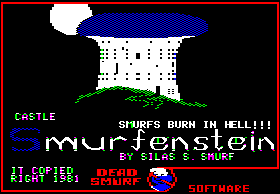 Tom Woodward turned me on to this fascinating keynote presentation by pirate radio DJ Matt Mason, author of The Pirate’s Dilemma, at The Medici Summit on March 3rd 2008. It resonated on several levels about issues that have been circulating for a while now in regards to re-mixes, mashups, and all things copyright in educational technology. This talk highlights some excellent example of the tremendous creative value of re-mixing in relationship to corporate competition —which is not my particular bag— yet many of his points can be ported over to the educational sphere somewhat easily. Namely, embrace the re-mix and understand the culture of piracy as an innovative force that often emerges as a way to fill a void or gap in the current models of cultural distribution. My favorite example of the re-mix is the re-working of the classic 1980s video game Castle Wolfenstein into Castle Smurfenstein, which the game designers embraced and proved to be a tremendous boon to the cultural significance and popularity of the original.
Tom Woodward turned me on to this fascinating keynote presentation by pirate radio DJ Matt Mason, author of The Pirate’s Dilemma, at The Medici Summit on March 3rd 2008. It resonated on several levels about issues that have been circulating for a while now in regards to re-mixes, mashups, and all things copyright in educational technology. This talk highlights some excellent example of the tremendous creative value of re-mixing in relationship to corporate competition —which is not my particular bag— yet many of his points can be ported over to the educational sphere somewhat easily. Namely, embrace the re-mix and understand the culture of piracy as an innovative force that often emerges as a way to fill a void or gap in the current models of cultural distribution. My favorite example of the re-mix is the re-working of the classic 1980s video game Castle Wolfenstein into Castle Smurfenstein, which the game designers embraced and proved to be a tremendous boon to the cultural significance and popularity of the original.
If you have the time, it is well worth a watch…
[kml_flashembed movie="http://video.google.com/googleplayer.swf?docid=-6483543718966313073" width="400" height="326" wmode="transparent" /]


Pingback: Bittorrent » The Pirate’s Dilemma
I didn’t mean to turn you on.
I was only trying to be nice, only trying to be nice . . .
Are you quoting a song? Is that someone else’s intellectual property? Are you breaking copyright on the bava? Are you plagiarizing? I’ll delete that comment right now, young man. Just you watch me!
I wonder what the Non-Programistan stance on copyright is? Could be a fun add on. Maybe a Non-Programistani Guide to Progressive Online Copyright Agitation is in order.
Or maybe this is just for pirates? I’ll have to see what pirates write.
Isn’t all creative work mashup? This comment uses the same 26 letters as all the others, right? So the only question is where in the sand (or on the water) do we draw the imaginary line between that which we all can use freely and that which someone “owns” (i.e., that from which someone is able to alienate us)? It’s not a purely academic question. One likes to think law, even legal fictions like IP, have some grounding in reality. The purpose of the Patents and Copyrights clause in the Constitution is expressly stated to be “the promotion of the useful arts and sciences.” The day copyright and patent laws interfere with that purpose, that day those laws become unconstitutional.
An extreme view, to be sure, and one with no political legs. At least not until enough of us have thought it through and begin developing the political will. Intellectual property is no less theft than other kinds.
Phaedral,
Can we start a nation together? Or at least take to the seas where the laws of the land don’t impact our cultural psyches so harmfully. Beautifully said, where have you been all the bava’s life?
Well, since the late 90’s I’ve been rattling @fncll’s cage with my extremist rhetoric. I’m always a little smarter once he’s whittled my bombast down to size. As for the nation, we’re not alone, just hopelessly outnumbered—and more importantly, out funded. I suspect we’ll have to wait for the tech to force the issue. Meanwhile, here’s a fun read, titled “Against Intellectual Property” (Chap 3 of Information Liberation by Brian Martin):http://www.uow.edu.au/arts/sts/bmartin/pubs/98il/il03.html
The revolution is now? 🙂